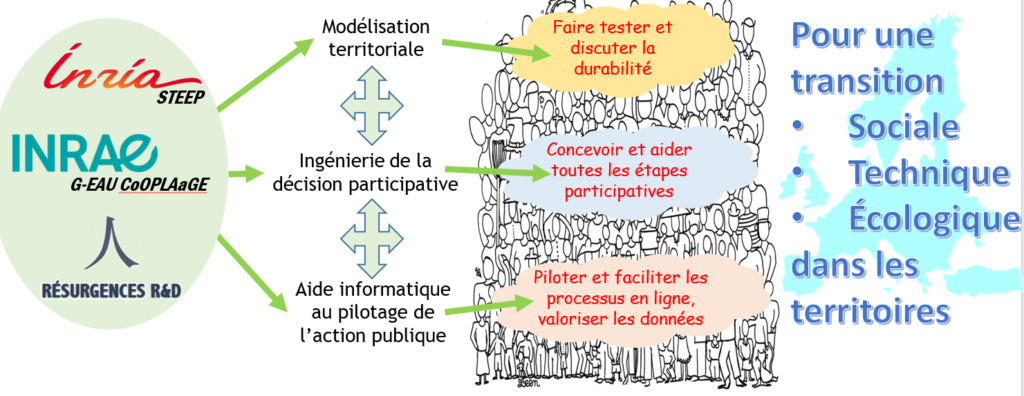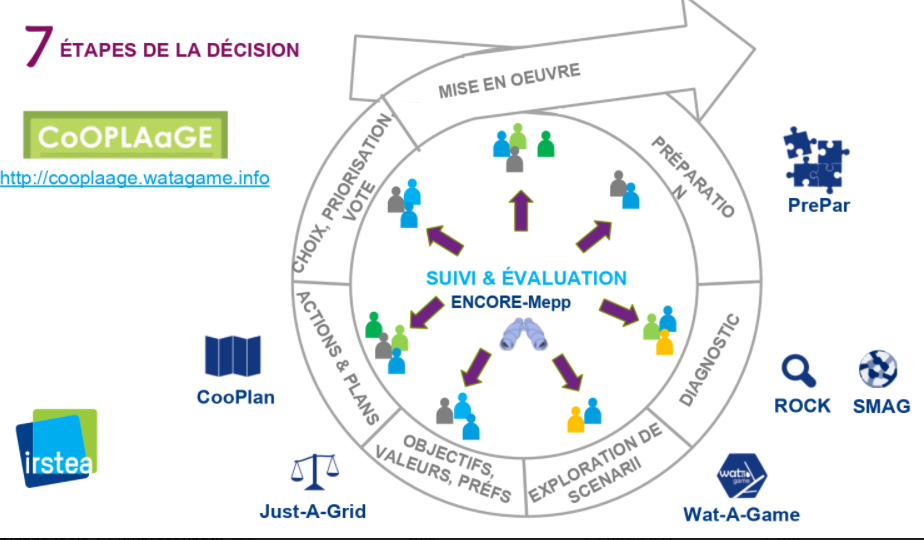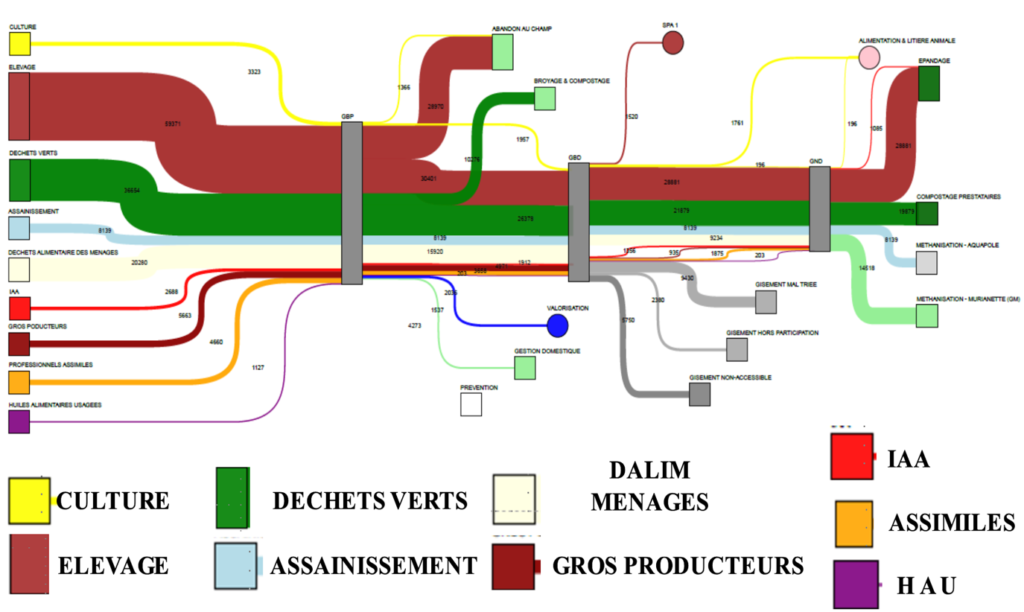Brouillon créé le 29 March 2023 à 15h16
10 January 2023
(Français) La notion de sobriété renvoie à une distinction implicite entre désirs et besoins, la distinction entre...
More info
Supporting your participatory programs for citizen-supported ecological and technical transitions
A research-intervention offer for your territory
Associating research teams from INRAE (formerly IRSTEA) and INRIA, and the companies Résurgences R&D and Terriflux, we propose new methods and tools, resulting from scientific research, to territories committed to the socio-ecological transition for :
3 axes of research-intervention are proposed. They combine innovation, experimentation, modeling and training:
Axis 1: Engineering methods and tools for the participation of all stakeholders (including citizens) in the various decision-making stages (organization of participation, framing of monitoring-evaluation, diagnosis, objectives, planning, choice, steering) of the project;
Axis 2 : The participatory use of territorial modeling to help you think about your transition(s);
Axis 3 : IT support for design, management and participation, at the service of elected representatives, managers and citizens.
Partnership projects will be set up to support these approaches in a sustainable way, with "co-piloting" based on monitoring of the processes and evaluation of their impacts. In practice, this means working with you to develop intervention programs that meet the needs of your territories by mobilizing and adapting together the methods resulting from our research.

| Scenario 1: In an area with a proven water quantity deficit with a Water Resources Management Plan (WRMP), how can we help design a compatible Ecological Transition Contract (ETC)? The irrigated agriculture of the territory being a major consumer (and employer), with "virtual" water transfers out of the basin. ⇒ How to orient an ETC and a possible agricultural plan to relocate these uses and contribute to energy and food autonomy? How to distribute the effort on water - jobs - energy to the various users? How to co-design and provide the methods and tools to organize participation and to feed the dialogue on: the inventory of fixtures, proposals for alternatives (e.g. water reuse, agri-photovoltaism, cultural practices…), their evaluation according to different criteria, dialogue and finally co-decision. Scenario 2: A mountain territory faces an increase in unemployment due to the desertion of tourists. The analysis of the wood sector shows a significant production of raw material which is exported abroad and then re-imported as a finished product. ⇒ What would be the relevance and impacts (social, economic, environmental, …) of relocating a sawmill and a furniture factory in the area? Scenario 3: A territory already produces locally 5% of the food consumed by its inhabitants and wishes to increase its resilience by helping the conversion of farms. It also has to decide whether to build a new neighborhood on arable land under heavy residential pressure. The land-use analysis shows that the artificial ratio is already substantial and that the flood hazard would be aggravated by further expansion. SCOT and SAGE are still to be coordinated. And a residents' association is fighting against any change. ⇒ How to support a new deliberation between all these actors? How can we help evaluate the various complex options? |
Beyond these scenarios requiring sectoral knowledge, a clearly identified difficulty of transition approaches is the consideration of interactions between sectors. This requires a systemic analysis of the targeted territory. In this framework, an assessment of the incoming and outgoing flows of a territory in terms of water, food, energy and raw materials is a necessary first step. We propose to accompany you in the implementation of a systemic approach adapted to the local stakes.
INRAE G-EAU : Participation and Decision Engineering Team (IPD)
Since 2003, the IPD team has developed a set of participatory decision-making methods gathered in the "CoOPLaGE" program (see figure on next page), adapted to the needs of actors of all types and levels, and validated in numerous international projects. It provides training to actors, either in person or via online training. In this way, it supports public institutions in processes of change by mobilizing innovative approaches that are then made freely available to all. The tools are either face-to-face (hardware), digital or hybrid.

STEEP : The INRIA STEEP research team has been working for about ten years on the modeling and analysis of environmental pressures in the biomass sector in France and its regions (see https://flux-biomasse.fr). It has carried out in-depth work (thesis of Michela Bevione) on the socio-ecological issues (quantitative and qualitative) related to the Beaufort sector in the Maurienne valley. She also conducted a study on the evaluation of bio-waste deposits in the Grenoble metropolitan area (see figure below).
Terriflux is a company in incubation within the Inria Startup Studio nursery. A member of the STEEP team, it is specialized in the analysis of physical flows involved in the sectors (production, processing, transport, consumption, end of life) as well as the environmental and socio-economic issues associated with these flows.

Résurgences R&D is an R&D and consulting company specialized in IT for public policy support. Partner of the UMR G-EAU, it is currently developing the eCOoPLAaGE IT service, which should give actors access to all the functionalities of CoOPLAAGE online. This includes, for example, CoOPILOT, a specific tool to help manage participatory processes.
Setting up joint projects with various funders: MTE, ADEME, OFB, regions, Europe, foundations, EAFRD?
Montpellier 3M, Annecy, Grenoble, Lyon, Poitiers, Argelès, SUD (Serre-Ponçon - Ubaye - Durance), Cerdagne, Pays d’Arles, Briançonnais, Thau, PNR Luberon, PNR Chartreuse, PNR Vercors, ...
| Mathieu Mangeot Mathieu.Mangeot@inria.fr INRIA STEEP Grenoble Tel. 0954493197 |
Nils Ferrand |
Samuel Tronçon stroncon@resurgences.eu Résurgences R&D Arles Tel. 0652953118 |
10 January 2023
(Français) La notion de sobriété renvoie à une distinction implicite entre désirs et besoins, la distinction entre...
More info26 November 2019
(Français) La notion de sobriété renvoie à une distinction implicite entre désirs et besoins, la distinction entre...
More info